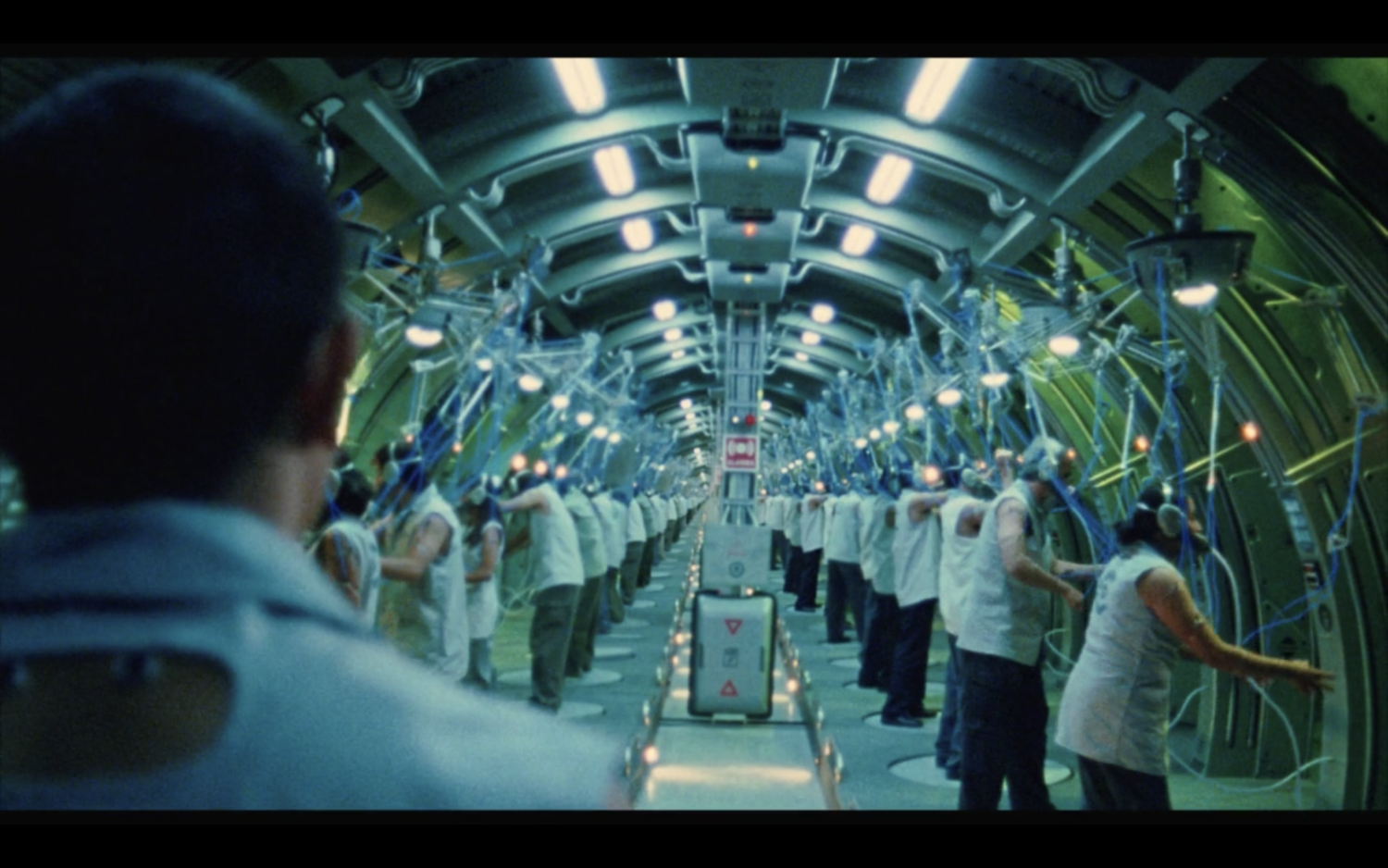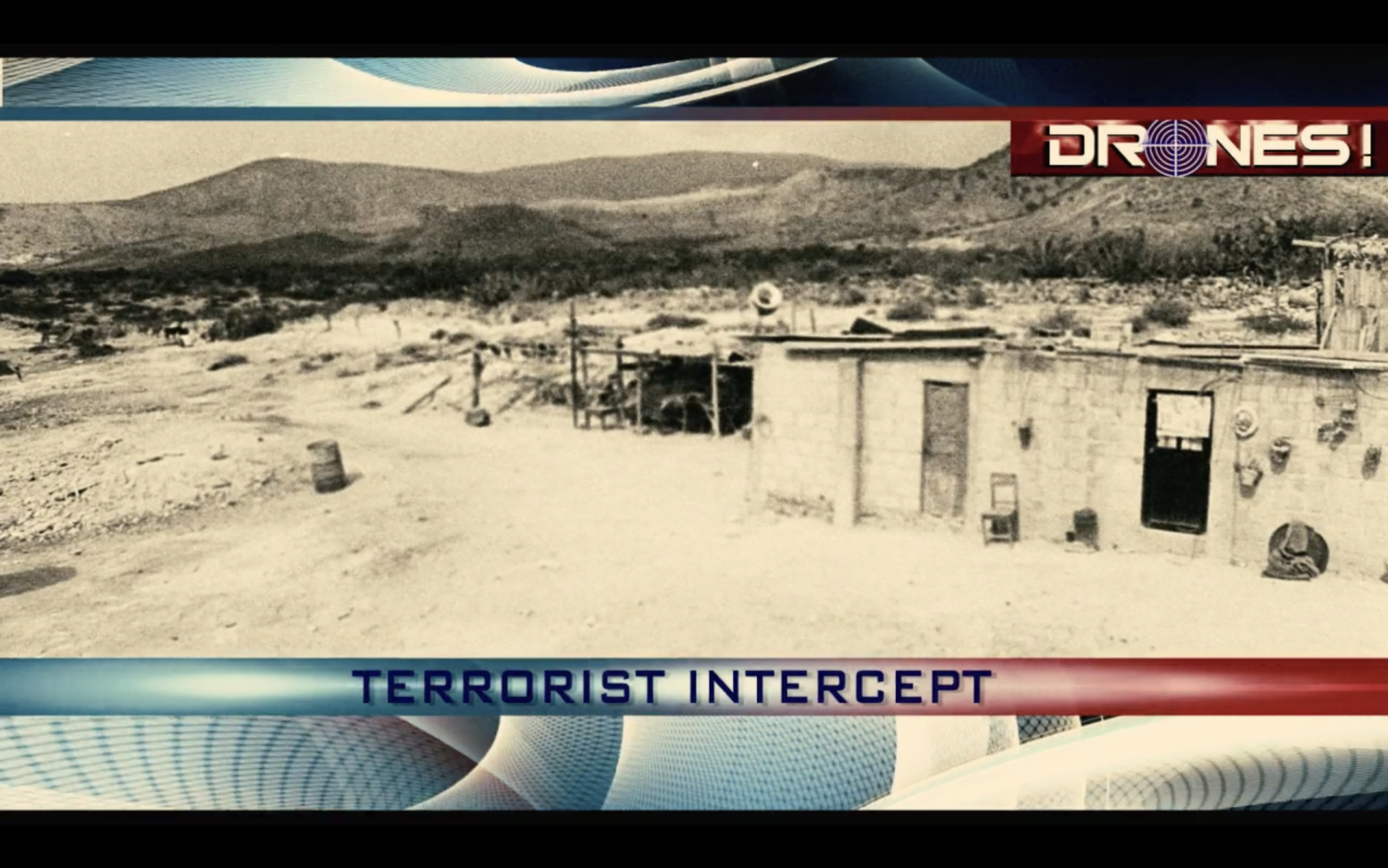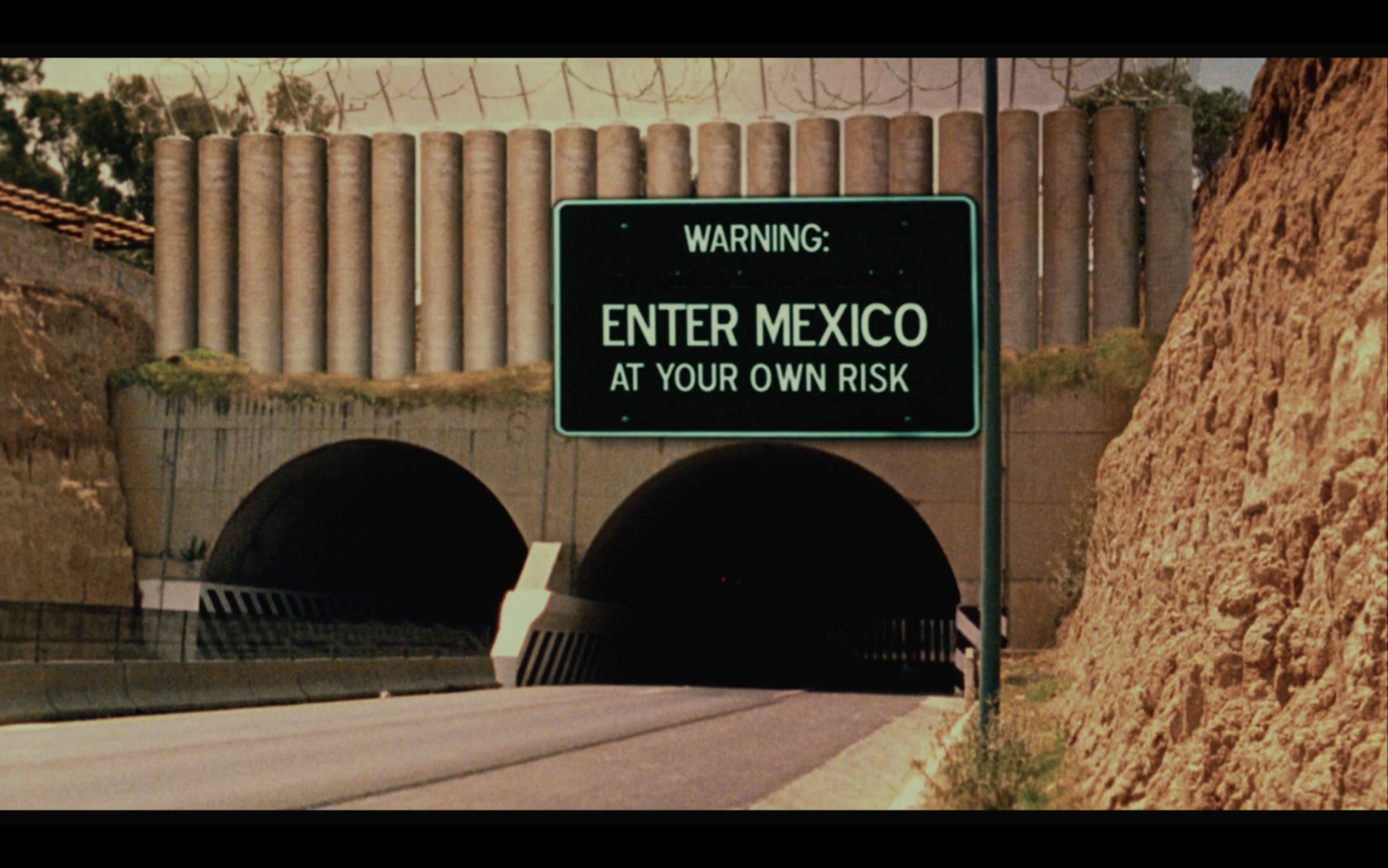Viewing Sleep Dealer as Teoria Povera in the Trump Era: Rhetorical Coloniality, Reality Television, and Water Dispossession
On June 16, 2015, Donald J. Trump promised, “I will build a great, great wall on our southern border. And I will have Mexico pay for that wall” (“Remarks Announcing Candidacy”). This promise energized Trump’s presidential campaign and signaled his investment in rhetorical bordering, or the process through which rhetors negotiate national boundaries and civic identity (Chávez; Cisneros; Coskan-Johnson; DeChaine; Flores; Ono and Sloop). Within a week of his inauguration, Trump affirmed his controversial vow by ordering “the immediate construction of a physical wall on the southern border” (“Executive Order”). He later doubled-down on these efforts by shutting down the federal government and declaring a national emergency to procure funds for his contentious project. Even so, Trump has repeatedly failed to secure full funding for a barrier between the US and México.1
While the fate of the proposed border wall hangs in the balance, the same is not true for the US-México border wall in Sleep Dealer, a 2008 science fiction film by Peruvian-American writer/director Alex Rivera. In this Spanish-English film set in the near future, a high-tech border wall seals off the US from México. Mexicanos no longer enter the US to work and instead use virtual labor technologies to perform services from afar, which serves as a techno-futuristic play on the twentieth century bracero program (Rivera, “Cybracero Systems”; Rivera, “Why Cybraceros?”). The film revolves around this storyline as Memo Cruz moves to Tijuana, México—the “city of the future”—to work as a “sleep dealer.” This titular occupation tasks him with plugging cables into his body to control robots stationed in the US (Figure 1). In doing so, Memo and the other sleep dealers create a situation in which, as their boss states plainly, “Le damos a los Estados Unidos lo que siempre han querido: todo el trabajo sin los trabajadores [We give the United States what they have always wanted: all the work without the workers].” With this in mind, Sleep Dealer eerily foreshadows what might happen if a component of Trump’s rhetoric—the “Latino Threat Narrative” (Chavez 3)—leads to the construction of an impenetrable barrier between the US and México.

The world imagined in Trump’s rhetoric is not necessarily the future predicted by Sleep Dealer; however, in an increasingly digital and far from post-colonial system that structures US-México relations, it is possible a high-tech border wall may one day separate these nations from one another. Under these circumstances, Sleep Dealer invites rhetoricians to consider what a high-tech border wall might mean for rhetorical coloniality: an umbrella term for the myriad discursive practices through which western elites facilitate and justify colonial activity.2 In particular, Sleep Dealer theorizes a potential relationship between rhetorical coloniality and the use of reality television to metaphorically manage American perspectives of themselves as “high-tech heroes” and Mexicanos as “terrorists.” Sleep Dealer does so through its in-film reality television series Drones!, which features unmanned aerial vehicles murdering Mexicanos who threaten American control of dispossessed water.
In theorizing the role of reality television in perpetuating what Catalina M. de Onís designates as “energy coloniality,” or “a system that colonizes places and peoples to control different energy forms” (537), Sleep Dealer forwards its own decolonial theory about the use of symbols to propagate hierarchies grounded in racial difference. Indeed, as I argue in this article, Sleep Dealer advances its own teoria povera [poor theory] about rhetorical coloniality vis-à-vis reality television, meaning the film presents “a rearguard theory based on the experiences of large, marginalized minorities and majorities that struggle against unjustly imposed marginality and inferiority, with the purpose of strengthening their resistance” (Santos ix). This teoria povera enhances rhetorical knowledge about the discursive practices used by western elites to carry out acts of dispossession, which decolonial rhetoricians should find insightful given their investment in better understanding views from the underside of modernity.
To defend this assertion, I first discuss the connection between Sleep Dealer and coloniality to identify Rivera as a decolonial rhetor and his film as the source of teoria povera. I then analyze the role of metaphor in Drones! to illustrate how Sleep Dealer advances its own teoria povera about rhetorical coloniality in regard to reality television. I finally conclude by elaborating on the significance of Rivera’s teoria povera in the Trump era—an age arguably characterized by an intimate relationship between reality television and the American presidency (Klein; Miller).
Sleep Dealer as Teoria Povera
Sleep Dealer takes place in a fictionalized version of Santa Ana del Rio, which is a rural municipality in Oaxaca, México. Set in the near future, the film features Santa Ana under the control of a private American water company, Del Rio Water, which has impacted the region by damming up its river to export water to the US. Without access to the river, locals must purchase overpriced water from Del Rio Water (e.g., 35 liters of water costs 85 dollars). It is within this environmental frame—one that emphasizes fluvial rather than land-centric conceptions of dispossession (Na’puti)—that Sleep Dealer unfolds.
Audiences meet Memo as he and his papá cross the desert to purchase water, which puts them in contact with drones, barbed wire fences, sentry cameras, machine guns, and weaponized police. These objects and characters metonymically associate Santa Ana with the colonial themes of foreign invasion, dispossession, and subordination (Figure 2). Memo amplifies this association by revealing that even though he perceives his home as “seca, sola, desconectada [dry, alone, disconnected],” his papá nostalgically remembers a time before Del Rio Water dispossessed the region of its water. As Memo’s papálaments while standing in a dry river bed, “Tuvimos un futuro. Estás parado en él. Cuando ellos obstruyeron el río, cortar nuestro futuro [We had a future. You’re standing on it. When they dammed up the river, they cut off our future].” In effect, the opening scenes indicate energy coloniality—a system that provokes “relationships of planned dependence and exploitation” (Schneider and Peeples 8)—is a mundane structure of everyday life in Santa Ana.

In portraying exogenous domination as constitutive of its setting and plot, Sleep Dealer moves audiences to detect the role of foreign invasion, dispossession, and subordination in structuring the world of its characters. The film notably presents its story as taking place in a futuristic version of a real location, which is a stylistic choice that locates Sleep Dealer’s setting and plot within the greater history of the European colonization of the Américas. Doing so establishes continuity between what has happened and what could happen to Mexicanos, thus animating Sleep Dealer as a movie about what might happen in a world made manifest by a high-tech border wall. Rivera suggests such when he argues his film advances “a certain vision of development” that compels audiences “to think about how so-called ‘development’ has been happening there [Oaxaca] and where it might go” (“Science Fiction from Below”). In this way, Sleep Dealer departs from dominant discourses on colonialism that position exogenous domination as a “ghost-like presence” to life in the here-and-now (Ono 4).
As a result, Sleep Dealer does the work of Latin American decolonial theory in that it delinks from portrayals of modernity as disconnected from colonialism and instead theorizes coloniality as an enduring, ever-changing structure for the entangled worlds of its audiences and characters. Coloniality refers to the ripples of colonial thought and practice in a world that is far from post-colonial. In the words of de Onís, “Coloniality is a racialized system of modernity and capitalism that categorizes, capitalizes on, and controls based on dichotomous hierarchies that mark colonized peoples as subhuman and uncivilized” (537). As a concept with roots in Latin American decolonial theory (Lugones; Maldonado-Torres; Mignolo and Walsh; Quijano), coloniality names a system with recourse to the tragic events of October 12, 1492, which is a date signifying when a set of murderous and hypocritical European nations began interfacing with the so-called “discovered” populations of the “New World” (O’Gorman).3 Importantly, coloniality presumes the dynamic nature of colonial thought and practice even as modernity’s hegemonic rhetoric suggests otherwise. Sleep Dealer coheres with this understanding of coloniality and informs audiences that colonialism—like an object in a rearview mirror—is closer than it might appear. In fact, as Rivera contends, Sleep Dealer goads audiences to “visualize the future […] from the point of view of the present” (Lemons) and to recognize “that underdevelopment is not an earlier stage of development, but rather is the product of development” (Rivera, “Science Fiction from Below”).
For these reasons, I advocate for the treatment of Rivera as a decolonial rhetor and Sleep Dealer as his teoria povera: a type of “theory of the flesh” that emphasizes the findings of those who are intimately affected by the darker side of western modernity (Moraga and Anzaldúa 19). Rhetoricians can and should treat films like Sleep Dealer as objects of study from which they might craft their own decolonial theories; doing so helps expose “epistemicide,” or “the murder of knowledge” to benefit western elites (Santos 92). Yet, rhetoricians should also go one step further and treat films like Sleep Dealer as the purveyors of decolonial theories in and of themselves. I make this claim with recourse to Darrel Allan Wanzer, who argues all rhetoricians “must seek to become decolonial rhetoricians” (654). Wanzer extends this call due to the perennial ramifications of the coloniality of knowledge, or the systematic eradication, repression, and expropriation of those “peripheral” knowledges dubbed by the proverbial “center” as invalid or threatening (Quijano). As I contend, treating films as the source of teoria povera is one additional way rhetoricians can respond to Wanzer’s invitation to act as decolonial rhetoricians and, in turn, resist the coloniality of knowledge.
Sleep Dealer is an apt candidate for this treatment in that it delinks from coloniality by inviting audiences to “dwell” with Mexicanos, which serves as the core methodological distinction of Latin American decolonial theory (Mignolo, Darker Side xiii).4 Rivera, the self-described son of an immigrant and a member of “a family that’s mostly immigrant” (“Science Fiction from Below”), confirms his interest in the decolonial project of dwelling by testifying, “Sci-fi films almost always tell ‘outsider’ stories, yet so often the heroes are not really outsiders—they’re police (Blade Runner, Minority Report, etc.). With Sleep Dealer, I wanted to put one of our world’s true outsiders—a migrant worker—at the center of the story” (“Sleep Dealer”). Sleep Dealer is consequently more than just another film about the future. It is a film that makes known the fantastical future of the North will be “tied together” with a “nightmare reality somewhere in the South” (Rivera, “Science Fiction From Below”). In other words, Sleep Dealer is a film that embraces views from the underside of modernity by publicizing the decolonial truism “coloniality is constitutive of modernity” (Mignolo, “Introduction” 162).
What, then, does Sleep Dealer theorize about the relationship between rhetorical coloniality and energy coloniality in a world marked by a high-tech border wall? Rhetorical coloniality names the discursive means through which western elites facilitate and justify colonial thought and practice. These discursive means are inexhaustible in that colonial discourse is heterogenous and dynamic, which means each teoria povera only provides a limited account of the use of symbols in service of colonial activity. Insofar as Sleep Dealer is concerned, Rivera accounts for rhetorical coloniality with regard to the role of reality television in shaping perspectives about Americans and Mexicanos. It is through Drone! that audiences come to understand how western elites might use symbols to propagate hierarchies grounded in racial differences—ones that, following de Onís, afford Americans with “energy privilege” at the expense of Mexicanos (537).
Theorizing Reality Television as Rhetorical Coloniality through Drones!
Water dispossession troubles Memo’s family to be sure, but Sleep Dealer demonstrates these characters still find worthwhile ways to occupy themselves. In the scenes before and after Memo and his papá cross the desert, audiences learn about Memo and his hermano. The film first summons audiences to spy on Memo as he tinkers with a radio. As the camera pans across Memo’s bleak concrete bedroom, audiences spot a red textbook titled Hackear Para Principiantes. This object communicates Memo is interested in hacking and indicates he is more than a passive victim of energy coloniality.
Audiences then observe Memo’s hermano as he watches television. The camera pauses on a television juxtaposed against the sandy Santa Ana landscape, which affords audiences with an opportunity to better understand what programming exists within the film’s universe (Figure 3). Audiences listen with Memo’s hermano as the narrator of Drones!, a white cisgender man dressed in business attire, hyperbolically exclaims, “Every night on drones we take you live to the frontlines where high-tech heroes use cutting edge technology and blow the hell out of the bad guys.” As before, audiences learn water dispossession might overwhelm Santa Ana, but the film’s characters do not allow energy coloniality to envelop every facet of their being.

Yet, these two scenes do more than disrupt misconceptions of colonized peoples as incapable of making do within a system in which they have been made Other. These scenes also foreshadow the role of hacking and reality television to Sleep Dealer as a film about western elites controlling perceptions of Americans and Mexicanos. As a program modeled after “the tabloid TV culture represented and exaggerated” in the works of Dutch filmmaker Paul Verhoeven (Erickson), Drones! evidences that Americans are actively killing those they metaphorically designate as the “bad guys,” namely Mexicanos. A patriotic supercut of drones soaring through skies, fiery rockets, and exploding buildings confirm that Mexicanos are not safe under the watchful eye of Americans who metaphorically self-fashion themselves as “high-tech heroes.” Audiences quickly come to understand that while Memo might not be a bad guy in their eyes, his technological savviness is sure to provoke a deadly response from drone pilots.
Such is proven true after pilots catch Memo eavesdropping on their private conversations. Stationed in San Diego, California, these pilots encounter Santa Ana as a digital colony, or the virtualized image of actual territories as produced by “military, corporate, and state technologies of resource surveillance” (Gómez-Barris 97). They do so through “Fly-E Flying Cameras” attached to the drones, which enable them to “see every angle of the action” while maintaining a comfortable distance. While these pilots surveil regions like Santa Ana, they talk with one another. The tech-savvy Memo enjoys listening even as he does not enjoy the violent acts they commit.
After discovering an unauthorized listener, one pilot launches a rocket at Memo’s homestead, killing his unexpecting papá. This pilot does so in real time on Drones!, which Memo witnesses. Memo hears these tragic words as he realizes his behavior has gravely impacted his innocent papá:
This show contains depictions of graphic violence against evil-doers. If you have any young children at home, you won’t want them to miss it. The southern sector water supply is in constant crisis, and dams all around the world are a security risk for the companies that built them. This often comes under attack by legions of aqua-terrorists like the Mayan Army of Water Liberation, so the companies fight back. Tonight, we follow a rookie drone pilot who works protecting the assets of Del Rio Water.
It is the duty of that rookie pilot to “eliminate a terrorist intercept” by “blow[ing] the hell out of the bad guys” (Figure 4).

This monologue from Drones! aptly demonstrates how Sleep Dealer speculates on the future of rhetorical coloniality in propagating hierarchies grounded in racial difference. Drones! unapologetically turns the elimination of Mexicanos into a media spectacle by appropriating the rhetorical form of reality television for purposes of facilitating energy coloniality. The consequences of this iteration of rhetorical coloniality—one that metaphorically transforms Americans into “high-tech heroes” and Mexicanos into “terrorists”—differs depending on whether characters live above or below the film’s high-tech border wall.
Those characters above the high-tech border wall are Americans and they are the target audience of Drones! This audience believes their nation works for the good of humankind; therefore, pilots must be justified in eliminating life. Drones! legitimizes the decision to eliminate whoever is associated with the “terrorist intercept”—a metaphorical way of understanding eavesdropping as a criminal activity—by forwarding a perspective on private American water companies as defenders of assets, thus failing to acknowledge the link between these companies and extractivismo. Macarena Gómez-Barris describes extractivismoas “an economic system that engages in thefts, borrowings, and forced removals, violently reorganizing social life as well as the land by thieving resources” (xvii). Sharing genetics with the colonial trope of peoples and places as terra nullius, extractivismo is a notably violent process that transforms highly biodiverse regions like Santa Ana into extractive zones. Through Drones!, the US deflects attention away from its violent relation with extractivismo, including its treatment of more-than-human ecologies as extractive zones. The US deploys Drones! as form of justificatory rhetoric to metaphorically shape the image of Mexicanos/México in the American imaginary, which produces an image of México as a breeding ground for aqua-terrorists who threaten global water supplies. This portrayal, which is ominously similar to Trump’s portrayal of undocumented immigrants as “bad dudes” (@realDonaldTrump, “If”) and non-Americans as prone to terrorism (@realDonaldTrump, “New”), justifies the militarization of companies, the ongoing surveillance of México, and the elimination of Mexicanos. It is here that Sleep Dealer theorizes the interlocking role of metaphor and reality television in facilitating and justifying colonial activity.
Those characters below the high-tech border wall are Mexicanos. Drones! invites them to eavesdrop and asserts the US possess an important rhetorical capacity: the capacity to define. As Amardo Rodriguez summarizes, “Definitions are about who gets to define things. In short, definitions are about who has the political, ideological, institutional, and epistemological muscle to dictate how we perceive things and what things mean” (177). To Mexicanos, Drones! defines the US as the proper proprietors of surveillance technologies; water as a commodity properly owned by private water companies; and those who resist energy coloniality as “aqua-terrorists” (with the word “terrorist” being a sort of floating signifier that the futuristic US attaches to dissenting collectives). In short, Drones! defines what perceptions ought to exist in a world marked by a high-tech border, therefore issuing a warning for Mexicanos to know their place and, perhaps more importantly in a film about rhetorical bordering, stay in their place.
Conclusion
Trump says México will pay for the proposed border wall even though it is unlikely México will finance such a technology. But if the US does build an impermeable barrier on its southern border, then México will pay in other ways. As I have argued in this article, Sleep Dealer contends a future marked by a high-tech border wall is also a future marked by persistent racial hierarchies, namely ones managed through metaphor-laden reality television (Figure 5).

Rhetoricians should find this prediction especially worrisome given that Trump—a former reality television star—already perpetuates such racial hierarchies. In a polemical fashion closely associated with the form of reality television, Trump frequently takes to social media to refer to undocumented Mexicano immigrants as “illegals” (@realDonaldTrump, “Democrats”), “dangerous & violent criminal aliens” (@realDonaldTrump, “California”), and “bad ‘hombres’” (@realDonaldTrump). Moreover, Trump also positions countries like Méxicoas among “the most dangerous places in the world” (@realDonaldTrump, “Children”). In sum, the future predicted by Sleep Dealer might not perfectly align with the future imagined in Trump’s rhetoric, but Rivera is certainly not wrong for theorizing the potential link between reality television and rhetorical coloniality.
After all, it is not farfetched to believe the Trump Administration—or any political administration for that matter—might one day use reality television to facilitate and justify colonial activity at the border. Cops and Live PD are two popular reality television shows that already glorify law enforcement. These reality television series join Homeland Security USA, Border Security: America’s Front Line, and Border Live in suggesting that western elites have a long and still ongoing history of utilizing reality television. Sleep Dealer is consequently more than just another sci-fi film. As Rivera notes, Sleep Dealer is a film that “makes many predictions about the future,” including what Rivera contends as the “likely” case that one day “there will be a TV program where we follow drone pilots” (Erickson). In light of this prediction, just as it is important “to make sense of how the world works in the wake of Donald J. Trump’s election” (Skinnell 4), it is also important to make sense of how the world might work in the wake of Trump’s historic rise to the presidency. Viewing Sleep Dealer as teoria povera is one way to accomplish this exigent task.
Endnotes
- In line with Sleep Dealeras a dual language film, I use both English and Spanish. return
- The term “rhetorical coloniality” is akin to “rhetorical colonialism,” a concept that designates the discursive means through which settlers facilitate and justify territorial dispossession (Stuckey and Murphy 73; see also Kelly and Black). The key difference between these two terms is that rhetorical coloniality emerges from my engagement with Latin American decolonial theory rather than American Indian decolonial theory. Given the heterogeneity of colonial histories and decolonial theories (Young), I believe it is important to maintain a distinction between these two terminologies. Failure to do so puts rhetoricians at risk to commit the fallacy of “colonial equivocation,” or the presumption that colonialism unfolds in the same way in each context (Tuck and Yang 17-19). return
- Several decolonial purveyors of teoria povera espouse the described hypocrisy of western elites (Césaire; Fanon; Memmi). return
- As Mignolo indicates, it is not “where you reside but where you dwell” that serves as the basis for decolonial theory, or a genre of theory that aims to undercover, problematize, and delink from coloniality in its myriad forms (Darker Side xiii). return
Works Cited
- Césaire, Aimé. Discourse on Colonialism. Monthly Review P, 1955/2000.
- Chávez, Karma R. “Border Interventions: The Need to Shift from a Rhetoric of Security to a Rhetoric of Militarization.” Border Rhetorics: Citizenship and Identity on the US-Mexico Frontier, edited by D. Robert DeChaine, U of Alabama P, 2012, pp. 48-62.
- Chavez, Leo R. The Latino Threat: Constructing Immigrants, Citizens, and the Nation. Stanford UP, 2008/2013.
- Cisneros, Josue David. “(Re)Bordering the Civic Imaginary: Rhetoric, Hybridity, and Citizenship in La Gran Marcha.” Quarterly Journal of Speech, vol. 97, no 1, 2011, pp. 26-49.
- Coskan-Johnson, Gale. “Troubling Citizenship: Arizona Senate Bill 1070 and the Rhetoric of Immigration Law.” Present Tense: A Journal of Rhetoric in Society, vol. 1, no. 2, 2011, www.presenttensejournal.org/volume-2/troubling-citizenship-arizona-senate-bill-1070-and-the-rhetorics-of-immigration-law/.
- DeChaine, D. Robert. “Introduction: For Rhetorical Border Studies.” Border Rhetorics: Citizenship and Identity on the US-Mexico Frontier, edited by D. Robert DeChaine, U of Alabama P, 2012, pp. 1-17.
- de Onís, Catalina M. “Fueling and Delinking from Energy Coloniality in Puerto Rico.” Journal of Applied Communication Research, vol. 46, no. 5, 2018, pp. 535-560.
- Erickson, Steve. “Director Alex Rivera on Third-World SF.” StudioDaily, 16 Apr. 2009, www.studiodaily.com/2009/04/director-alex-rivera-on-third-world-sf/.
- “Executive Order: Border Security and Immigration Enforcement Improvements.” The White House, 25 Jan. 2017, www.whitehouse.gov/presidential-actions/executive-order-border-security-immigration-enforcement-improvements/.
- Fanon, Frantz. The Wretched of the Earth. Grove P, 1961/2004.
- Flores, Lisa A. “Constructing Rhetorical Borders: Peons, Illegal Aliens, and Competing Narratives of Immigration.” Critical Studies in Media Communication, vol. 20, no. 4, 2003, pp. 362-387.
- Gómez–Barris, Macarena. The Extractive Zone: Social Ecologies and Decolonial Perspectives. Duke UP, 2017.
- Kelly, Casey Ryan, and Jason Edward Black. “Introduction: Decolonizing Native American Rhetoric.” Decolonizing Native American Rhetoric: Communicating Self-Determination, edited by Casey Ryan Kelly, and Jason Edward Black, Peter Lang, 2018, pp. 1-23.
- Klein, Naomi. No is Not Enough: Resisting Trump’s Shock Politics and Winning the World We Need. Haymark Books, 2017.
- Lemons, Stephen. “Alex Rivera, Director of Sleep Dealer, Talks Sci-Fi, Immigration, and Robot Doctors Controlled from India.” Phoenix New Times, 6 Aug. 2010, www.phoenixnewtimes.com/news/alex-rivera-director-of-sleep-dealer-talks-sci-fi-immigration-and-robot-doctors-controlled-from-india-6502616.
- Lugones, Maria. “The Coloniality of Gender.” Globalization and the Decolonial Option, edited by Walter D. Mignolo and Arturo Escobar, Routledge, 2008/2010, pp. 369-390.
- Maldonado-Torres, Nelson. “On the Coloniality of Being: Contributions to the Development of a Concept.” Cultural Studies, vol. 21, no. 2/3, 2007, pp. 240-270.
- Memmi, Albert. The Colonizer and the Colonized. Beacon P, 1957/1991.
- Mignolo, Walter D. “Introduction: Coloniality of Power and De-Colonial Thinking.” Cultural Studies, vol. 27, no. 2/3, 2007, pp. 155-167.
- Mignolo, Walter D. The Darker Side of Western Modernity: Global Futures, Decolonial Options. U of Michigan P, 2011.
- Mignolo, Walter D., and Catherine Walsh. On Decoloniality: Concepts, Analytics, Praxis. Duke UP, 2018.
- Miller, Julie. “Is Reality TV Really to Blame for President Donald Trump?” Vanity Fair, 7 June 2018, www.vanityfair.com/hollywood/2018/06/is-reality-tv-really-to-blame-for-president-donald-trump.
- Moraga, Cherríe, and Gloria Anzaldúa, “Entering the Lives of Others: Theory in the Flesh.” This Bridge Called My Back: Writings by Radical Women of Color, edited by Cherríe Moraga and Gloria Anzaldúa, SUNY P, 1981/2015, p. 19.
- Na’puti, Tiara R. “Archipelagic Rhetoric: Remapping the Marianas and Challenging Militarization from ‘A Stirring Place.’” Communication and Critical/Cultural Studies, vol. 16, no. 1, 2019, pp. 4-25.
- O’Gorman, Edmundo. La Invención de América. Fondo de Cultura Económica, 1958.
- Ono, Kent A. Contemporary Media Culture and the Remnants of a Colonial Past. Peter Lang, 2009.
- Ono, Kent A., and John M. Sloop. Shifting Borders: Rhetoric, Immigration, and California’s Proposition 187. Temple UP, 2002.
- Quijano, Aníbal. “Coloniality and Modernity/Rationality.” Cultural Studies, vol. 21, no. 2/3, 1991/2007, pp. 168-178.
- @realDonaldTrump. “Border Patrol is apprehending record numbers of people at the Southern Border. The bad ‘hombres,’ of which there are many, are being detained & will be sent home. Those which we release under the ridiculous Catch & Telease loophole, are being registered and will be removed later!” Twitter, 17 May 2019, 3:44 a.m., twitter.com/realDonaldTrump/status/1129336982319050752.
- @realDonaldTrump. “California’s sanctuary policies are illegal and unconstitutional and put the safety and security of our entire nation at risk. Thousands of dangerous & violent criminal aliens are released as a result of sanctuary policies, set free to prey on innocent Americans. THIS MUST STOP!” Twitter, 13 Mar. 2018, 8:27 a.m., twitter.com/realdonaldtrump/status/973581274215473153.
- @realDonaldTrump. “Children are being used by some of the worst criminals on earth as a means to enter our country. Has anyone been looking at the Crime taking place south of the border. It is historic, with some countries the most dangerous places in the world. Not going to happen in the U.S.” Twitter, 19 June 2018, 6:50 a.m., twitter.com/realdonaldtrump/status/1008708576628625408.
- @realDonaldTrump. “Democrats used to support border security — now they want illegals to pour through our borders.” Twitter, 27 Apr. 2017, 7:39 a.m., twitter.com/realdonaldtrump/status/857605018266062848.
- @realDonaldTrump. “If the ban were announced with a one week notice, the ‘bad’ would rush into our country during that week. A lot of bad “dudes” out there!” Twitter, 30 Jan. 2017, 5:31 a.m., twitter.com/realdonaldtrump/status/826060143825666051.
- @realDonaldTrump. “New report from DOJ & DHS shows that nearly 3 in 4 individuals convicted of terrorism-related charges are foreign-born. We have submitted to Congress a list of resources and reforms….” Twitter, 16 Jan. 2018, 3:19 p.m., twitter.com/realdonaldtrump/status/953406423177859073.
- “Remarks Announcing Candidacy for President in New York.” The American Presidency Project, www.presidency.ucsb.edu/documents/remarks-announcing-candidacy-for-president-new-york-city. Accessed 1 June 2018.
- Rivera, Alex. “Cybracero Systems.” Cybracero Systems, www.cybracero.com. Accessed 15 June 2018.
- Rivera, Alex. “Sleep Dealer.” Alex Rivera, alexrivera.com/project/sleep-dealer/. Accessed 1 June 2018.
- Rivera, Alex. “Science Fiction from Below.” Alex Rivera, alexrivera.com/2012/10/21/science-fiction-from-below/. Accessed 30 June 2018.
- Rivera, Alex. “Why Cybraceros?” Alex Rivera, alexrivera.com/project/why-cybraceros/. Accessed 15 June 2018.
- Rodriguez, Amardo. “A New Rhetoric for a Decolonial World.” Postcolonial Studies, vol. 20, no. 2, 2017, pp. 176-186.
- Santos, Boaventura de Sousa. Epistemologies of the South: Justice Against Epistemicide. Routledge, 2014/2016.
- Schneider, Jen, and Jennifer Peeples. “The Energy Covenant: Energy Dominance and the Rhetoric of the Aggrieved.” Frontiers in Communication, vol. 3, 2018, www.frontiersin.org/articles/10.3389/fcomm.2018.00005/full.
- Skinnell, Ryan. “Introduction to Faking the News.” Faking the News: What Rhetoric Can Teach Us about Donald J. Trump, edited by Ryan Skinnell, Imprint Academic, 2018, pp. 1-6.
- Sleep Dealer. Directed by Alex Rivera, Performances by Luis Fernando Peña, Leonor Varela, and Jacob Vargas, Maya Entertainment, 2008.
- Stuckey, Mary E., and John M. Murphy. “By Any Other Name: Rhetorical Colonialism in North America.” American Indian Culture and Research Journal, vol. 25, no. 4, 2001, pp. 73-98.
- Tuck, Eve, and K. Wayne Yang. “Decolonization is Not a Metaphor.” Decolonization: Indigeneity, Education & Society, vol. 1, no. 1, 2012, pp. 1-40.
- Wanzer, Darrel Allan. “Delinking Rhetoric, or Revisiting McGee’s Fragmentation Thesis Through Decoloniality.” Rhetoric & Public Affairs, vol. 15, no. 4, 2012, pp. 647-657.
- Young, Robert J. C. Postcolonialism: An Historical Introduction (15th Anniversary Edition). John Wiley & Sons, 2016.
Cover Image Credit: https://search.creativecommons.org/photos/e6445a3c-8b76-444e-9215-0d7131c8cba7
Keywords: energy coloniality, reality television, rhetorical bordering, rhetorical coloniality, Donald J. Trump




 T. Jake Dionne (M.A., Syracuse University) is a doctoral candidate in the Department of Communication at the University of Colorado Boulder. His research considers how western institutions communicate about the more-than-human world, often to disastrous ends. His dissertation traces how settlers rhetorically mediate the social standing of the American bison to facilitate and justify territorial dispossession. You may follow him on Twitter
T. Jake Dionne (M.A., Syracuse University) is a doctoral candidate in the Department of Communication at the University of Colorado Boulder. His research considers how western institutions communicate about the more-than-human world, often to disastrous ends. His dissertation traces how settlers rhetorically mediate the social standing of the American bison to facilitate and justify territorial dispossession. You may follow him on Twitter